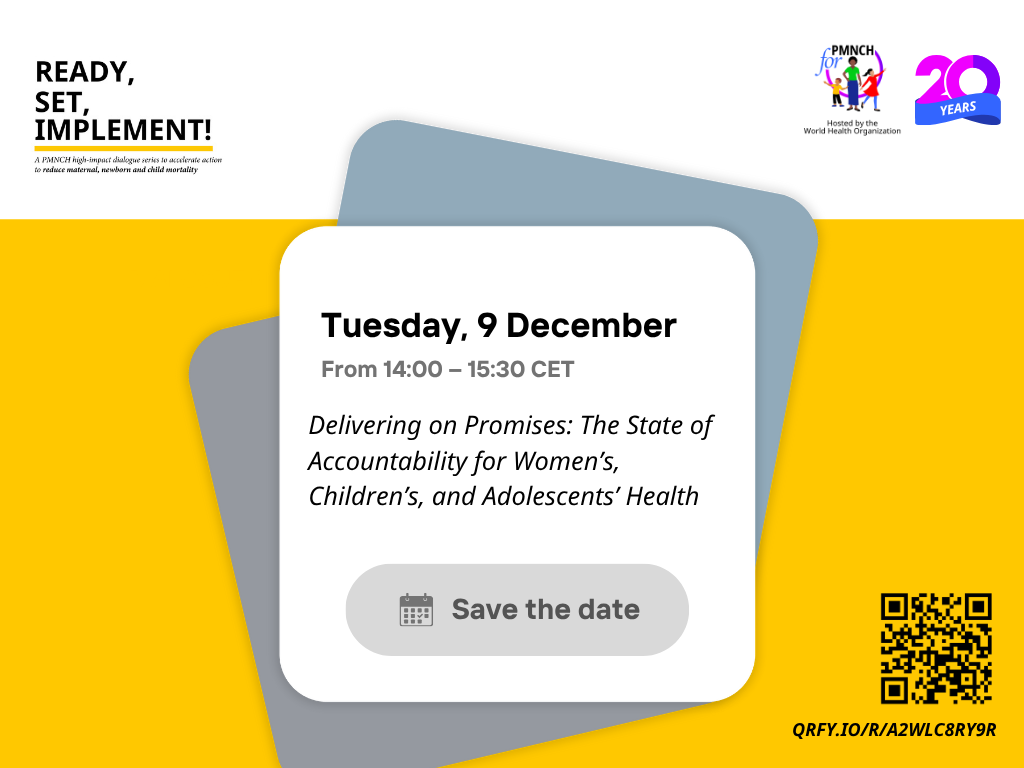
Watch the recording here
In today’s rapidly evolving and complex geopolitical landscape, marked by tightening fiscal space and disruptions to essential services, the urgency of turning commitments to women’s, children’s, and adolescents’ health (WCAH) into tangible results has never been greater. Despite important progress, too many promises remain unfulfilled, and the most marginalized continue to bear the heaviest burden.
To meet this moment, accountability must move from aspiration to action. We must consider a shift from top-down to bottom-up, rights-based approaches that elevate the voices of communities, social movements and the most vulnerable populations. New approaches must unite political, professional, financial, legal, and social accountability mechanisms to reinforce one another, creating a fabric of trust and responsibility that ensures no commitment remains rhetorical. In a world of constrained resources, accountability is not an add-on; it is the lever that ensures scarce resources are used wisely, transparently, and equitably.
Without stronger accountability, inequities in health outcomes will persist, deepening divides in already fragile contexts. But with robust and equity-sensitive accountability frameworks, WCAH can become a unifying agenda: one that channels political will, drives professional excellence, ensures financial integrity, and empowers communities to demand and shape the care they deserve.
Accountability processes are not only about monitoring progress and identifying gaps; they are also critical levers for improving implementation. They provide a platform for transparency, inclusivity, and responsiveness, helping to ensure that no one is left behind. For accountability to be truly effective, it must be equity-sensitive. This means not only tracking averages, but also exposing disparities – for example, by income, geography, age, gender, and other markers of inequality. Ensuring communities are empowered and people are at the centre of accountability efforts also strengthens the delivery of equitable access and implementation.
Recent innovations are transforming the accountability landscape. Digital accountability systems – including real-time health data dashboards, mobile reporting tools, and open-access platforms – make it possible to track resources and results with unprecedented speed and precision. Artificial intelligence (AI) is increasingly used to analyze large datasets, identify patterns of inequity, and predict where interventions can have the greatest impact. These technologies not only enhance monitoring but also support evidence-based decision-making, enabling more adaptive and responsive policies. Useful lessons can also be drawn from accountability tools, including the African Health Financing Scorecards, as spearheaded by the African Union. Such tools are being used to drive regional accountability and progress towards continental health security goals to strengthen health systems and secure domestic financing for health.
Yet, persistent challenges continue to undermine the translation of WCAH commitments into concrete, equitable outcomes, including weak data systems, shrinking civic space, and limited resources. These challenges make it vital to strengthen accountability frameworks that can safeguard commitments, drive smarter use of resources, and ensure that the voices of women, children, and adolescents remain at the center of action.
This high-level dialogue is part of PMNCH’s Ready, Set, Influence series that bring together policymakers, healthcare leaders, donors, and experts to discuss how countries can accelerate the implementation of the 77th World Health Assembly resolution (WHA77) on accelerating progress on maternal, newborn and child mortality. This webinar will focus on equity and the need for robust accountability systems that ensure commitments are implemented, measured, and acted upon.
Objectives
The dialogue aims to:
- Examine the current state of accountability for WCAH, with a particular focus on equity.
- Explore different accountability dimensions – political, professional, financial, legal, and social – and identify opportunities to strengthen them.
- Reflect on lessons from global leaders and accountability champions.
- Provide a clear call to action for improving WCAH accountability in the lead-up to Human Rights Day (10th December 2025) and the implementation of the new PMNCH Strategy (2026-2030)
Speakers
- Rajat Khosla, Executive Director, PMNCH
- Fadekemi Akinfaderin, Chief Global Advocacy Officer, Fòs Feminista
- Paul Hunt, Emeritus Professor, Essex Law School
- Naomi Hossain, Global Research Professor; Director SOAS Development for Transformation Centre, SOAS University of London
- Elizabeth Mason, Professor, LSHTM, former Co-Chair, Independent Accountability Panel (IAP)
- Landry Tsague, Director of Primary Health Care, Africa CDC
- Walter Flores, Research Professor, Accountability Research Centre, SIS, American University; Research Associate, Centre for the Study of Equity and Governance in Health Systems, Guatemala
- Asha George, South African Research Chair in Health Systems, Complexity and Social Change School of Public Health, University of the Western Cape, South Africa
- Sofia Gruskin, Distinguished Professor of Population, Public Health Sciences & Law, USC

.png?sfvrsn=6d0e27cd_1)



